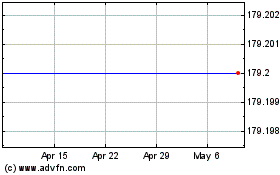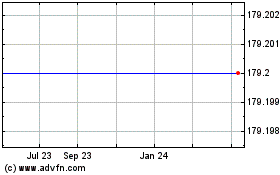Shire PLC (SHPG) filed a Form 8K - Changes to Articles of
Incorporation or Bylaws; Change in Fiscal Year - with the U.S
Securities and Exchange Commission on April 28, 2016.
On April 28, 2016 the shareholders of Shire plc (the "Company")
adopted new Articles of Association (the "New Articles") which
amended the Company's current Articles of Association (the "Old
Articles"). The principal changes between the Old Articles and the
New Articles are set out below.
Removal of references to the Scheme
Some changes were made to the Company's Old Articles to
reference events prior to, and following, the coming into effect of
a scheme of arrangement implemented between Shire
Biopharmaceuticals Holdings (previously known as Shire plc) ("Shire
UK") and its ordinary shareholders (as described in a circular sent
to shareholders of Shire UK in April 2008 ) (the "Scheme"). Now
that the Scheme has come into effect, these references are no
longer required and so they are not included in the New
Articles.
Bonus shares
In line with the requirements placed on UK incorporated
companies under the Companies Act 2006, the New Articles except the
issue of bonus shares from existing shareholders' right of
pre-emption in respect of the allotment of equity securities by the
Company.
Commission and brokerage fees
The New Articles reflect a change under Jersey law which means
that there is no longer a statutory limit on commission and
brokerage fees paid by the Company.
Information requested from shareholders by the Company
The Old Articles allow the Company to require any person whom
the Company knows or believes is interested in the Company's shares
to confirm that fact, to give particulars of their present or past
interest in the Company's shares and to give particulars of any
other interests in those shares. The New Articles extend this
authority such that, in addition to the information requirements
outlined above, the Company may require the provision of such
information as the Board may determine is necessary in order for
the Company and its agents to be able to comply with their
respective legal and regulatory obligations.
The New Articles do not change the provisions of the Old
Articles relating to the failure to comply with the information
requests set out above. These state that, where any person whom the
Company knows or believes is interested in the Company's shares
fails to comply with such a request from the Company within 14 days
of being notified, the relevant shares may no longer confer a right
to attend or vote at general meetings and, depending on the size of
the person's holding, the Board may withhold payment of any
dividends or other moneys payable in respect of the shares and/or
decline to register a transfer of the relevant shares (if they are
certificated) unless such a transfer is pursuant to an arm's length
sale. Where the information relating to such a request is
subsequently supplied to the Company, any withheld moneys relating
to the relevant shares shall be paid to the person so entitled.
Errors in voting
In accordance with usual market practice, the New Articles
reflect that the Company is not obliged to check whether a proxy or
corporate representative has voted in accordance with a
shareholder's instructions and, if a proxy or corporate
representative fails to vote in accordance with a shareholder's
instructions, this will not affect the decision of the meeting or
adjourned meeting or poll.
Receipt of proxies
In line with a recent change under Jersey law, the New Articles
reflect that the earliest deadline which can be specified by the
Board for the delivery of proxies for a general meeting is 48 hours
before the time of the meeting (including or excluding non-working
days at the Board's discretion).
Corporate representatives
In order to reflect the position applicable to UK incorporated
companies under the Companies Act 2006, the New Articles state that
a body corporate can appoint more than one corporate representative
in respect of a shareholding provided that each such corporate
representative is appointed to exercise the powers attached to
different shares.
Directors' fees
In order to accommodate the appointment of new Non-Executive
Directors following the anticipated completion of the announced
transaction with Baxalta Inc, the New Articles increase the limit
on the aggregate fees payable to Directors from 2,000,000 to
3,000,000 per annum.
Borrowing limit
On April 29, 2014, the limit on the aggregate principal amount
outstanding in respect of monies borrowed by the Group was
increased by ordinary resolution from $4,000,000,000 to
$12,000,000,000. The New Articles reflect this historical
amendment.
Overseas branch registers
In line with a change under Jersey law, the New Articles reflect
that the Company is no longer restricted in respect of which
members can be entered on an overseas branch register.
Income Access Arrangements
The New Articles make changes to the Company's income access
arrangements (the "IAS Arrangements") in order to facilitate
certain reporting obligations which have arisen as a result of
recent developments in global tax law (namely, the introduction of
the Foreign Account Tax Compliance Act and the Common Reporting
Standard). The provisions of the New Articles are intended to
facilitate the new reporting requirements and safeguard the
Company, its subsidiaries and/or the income access trustee (the
"IAS Trustee"), and each of their respective agents, in the event
of any future changes to legal and/or regulatory requirements
applicable to the IAS Arrangements, and therefore to support their
ongoing operation.
In particular, the New Articles state that any election made by
a shareholder to be paid dividends by a subsidiary of the Company
resident for tax purposes in the United Kingdom (an "IAS Election")
shall only be deemed to have been made in relation to any dividend
if the relevant shareholder: (i) provides the Company with such
information as the Board may determine is necessary in order for
the Company, any of its subsidiaries and/or the IAS Trustee, and
each of their respective agents, to comply with any applicable
legal and/or regulatory requirements relating to the payment of any
amounts under the IAS Arrangements; and (ii) complies with such
other terms as the Board may determine by way of written notice to
the relevant shareholder or by way of publishing a written notice
on a website from time to time. Furthermore, failure by a
shareholder that made an IAS Election (or was deemed to have made
an IAS Election) under the Old Articles to comply with (i) and (ii)
above in relation to any dividend shall result in their election
being deemed not to have been made in respect of that dividend
(unless the Board, at its discretion, determines otherwise).
Given the above (in particular, the requirement for a
shareholder, when making an IAS Election, to provide the Company
with information and to comply with terms pursuant to (i) and (ii)
respectively), with effect from the adoption of the New Articles,
the default arrangement under the Old Articles whereby an IAS
Election is deemed to have been made by a shareholder that holds
25,000, or fewer, Ordinary Shares will cease to take effect.
However, the New Articles allow the Board the discretion to
re-instate this arrangement, or to implement a similar arrangement
(on such terms as the Board considers appropriate), in the future
should the Board consider, amongst other things, it to be
administratively feasible and in the best interests of shareholders
generally.
The opportunity has also been taken to allow the Board a wider
discretion to amend and update the terms of the IAS Arrangements in
the future should the Board determine that it is necessary to do
so.
Payment procedure
The New Articles allow the Company to make a variety of payment
methods available in respect of any dividend or other money payable
in cash relating to a share. The New Articles clarify that
shareholders are required to provide such information to the
Company as is necessary in order for it to pay dividends or other
money payable in cash (and failure by the shareholder to provide
such information may result in the dividend or other money payable
being treated as unclaimed).
Scrip dividend period
In line with guidance issued by the Investment Association, the
New Articles reduce, from five to three years, the maximum period
for which the Company is permitted, under any single authority, to
offer shareholders the right to elect to receive Ordinary Shares,
credited as fully paid, instead of cash in respect of the whole (or
some part) of any dividend.
General
As it is proposed to adopt the New Articles in order to effect
the changes described above, the opportunity has been taken
generally to include some clarificatory amendments in certain other
parts of the New Articles.
...This item was truncated.
The full text of this SEC filing can be retrieved at:
http://www.sec.gov/Archives/edgar/data/936402/000095010316013007/dp65302_8k.htm
Any exhibits and associated documents for this SEC filing can be
retrieved at:
http://www.sec.gov/Archives/edgar/data/936402/000095010316013007/0000950103-16-013007-index.htm
Public companies must file a Form 8-K, or current report, with
the SEC generally within four days of any event that could
materially affect a company's financial position or the value of
its shares.
(END) Dow Jones Newswires
April 29, 2016 18:47 ET (22:47 GMT)
Copyright (c) 2016 Dow Jones & Company, Inc.
Shire Plc ADS, Each Representing Three Ordinary Shares (NASDAQ:SHPG)
Historical Stock Chart
From Mar 2024 to Apr 2024

Shire Plc ADS, Each Representing Three Ordinary Shares (NASDAQ:SHPG)
Historical Stock Chart
From Apr 2023 to Apr 2024
